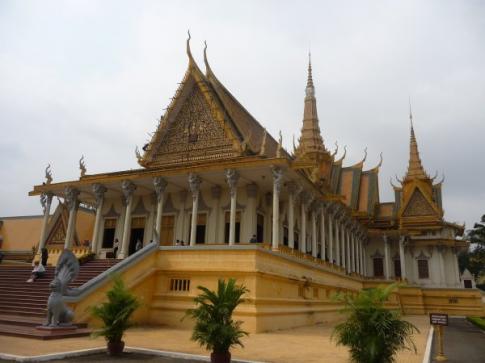The scent of lotus

Since then, tensions have been building in Phnom Penh, the capital. Armoured personnel carriers patrolled the streets. Troops tested rocket launchers and riot police rehearsed their responses to violent protesters.
by S.W. | PHNOM PENH
TO NO ONE'S surprise, final polling results on September 8th confirmed that Hun Sen, Cambodia's prime minister and leader of the ruling Cambodian People's Party (CPP), had won the election in July. He has been in power for 28 years. But the surprisingly close race (the CPP won 68 seats, down from 90 in the previous election) has emboldened the opposition Cambodia National Rescue Party (CNRP). By its calculations, it won 63 seats (not the 55 declared)—enough to form a government. It demanded that a joint committee, involving the UN, investigate alleged vote-rigging; and it called on supporters to protest in their thousands.
Since then, tensions have been building in Phnom Penh, the capital. Armoured personnel carriers patrolled the streets. Troops tested rocket launchers and riot police rehearsed their responses to violent protesters. But on September 7th, the CNRP met authorities with song, prayer and lotus flowers (a symbol of peace), as perhaps 20,000 demonstrators poured into the capital’s Freedom Park, a public square where protest is permitted.
Fears of bloodshed eroded with each chant. Police officers, whose increased presence on the streets has fuelled concerns of clashes, could only look on as protesters cheered and shared food. “Everyone voted for the CNRP, but the party didn’t win,” said Yean May, a demonstrator in her 50s who had travelled from neighbouring Kandal province. “This is my country, so I must come here to protest. But I’m not feeling scared at all.” Scores of monks, whose superiors had warned them not to demonstrate, risked eviction from their pagodas to join with youths and the elderly. They too prayed and cheered for the opposition leaders who took to the stage.
Since his party was unofficially declared to have lost the election last month, Sam Rainsy, the CNRP leader (pictured), has begun to refer to Mahatma Gandhi’s philosophy of passive resistance. He again declared his commitment to peace on Saturday: “The CPP has guns,” he told protesters, some of whom were tossing lotus leaves into the air. “The CNRP has flowers.” A royal pardon allowed Mr Sam Rainsy to return to Cambodia just before the ballot. Since then, his promises of ending “decades of hardship and violence” have captured the attention of thousands.
As well as playing peacemaker on Saturday, Mr Sam Rainsy pushed on with his request for an investigation. “We want you to recount votes,” he said, referring to a number of seats the CNRP believes it should be awarded. “If you can’t do that, there must be a re-vote.” The opposition leader also called on intervention from the country’s usually apolitical king, Norodom Sihamoni. Mr Sam Rainsy threatened more mass demonstrations if the CNRP’s wishes are denied.
The final figures released on Sunday confirmed Mr Hun Sen's victory, which the CNRP immediately rejected. But the stand-off looks set to continue. Mr Sam Rainsy has warned the CPP that it will have to suffer the consequences of deadlock. Mr Hun Sen has said his party will happily take the opposition’s 55 seats if the CNRP boycotts the first session of the new National Assembly, due to open later this month. And on Sunday the opposition vowed to continue its protests. A military police spokesman told local media that would only result in CNRP supporters feeling “exhausted and bored”. Mr Sam Rainsy may now be far from power, but the enthusiasm of his protesters is far from dimmed. /economist




 del.icio.us
del.icio.us Digg
Digg

Post your comment